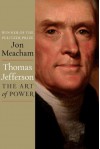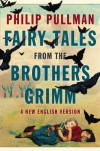Currently reading
400 Years Of Freethought
Thomas Jefferson: The Art of Power
Fairy Tales from the Brothers Grimm: A New English Version
Doubt: A History: The Great Doubters and Their Legacy of Innovation from Socrates and Jesus to Thomas Jefferson and Emily Dickinson
The Kingdom of Matthias: A Story of Sex and Salvation in 19th-Century America
The Populist Vision
 Populists, Postel says were “influenced by modernity and sought to make America modern.” Postel shows rural people embracing change, and especially technological change that made their work and lives easier and more rewarding. This challenges the dominant strain of thought (especially Hofstadter) that sees rural people and especially populists as cranky victims of change, who looked back nostalgically to an earlier age when the rest of the world shared their agrarian “producer” philosophy.
Populists, Postel says were “influenced by modernity and sought to make America modern.” Postel shows rural people embracing change, and especially technological change that made their work and lives easier and more rewarding. This challenges the dominant strain of thought (especially Hofstadter) that sees rural people and especially populists as cranky victims of change, who looked back nostalgically to an earlier age when the rest of the world shared their agrarian “producer” philosophy.
The Making of an American Thinking Class: Intellectuals and Intelligentsia in Puritan Massachusetts
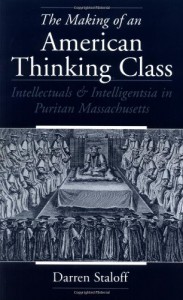 Staloff’s thesis is that Puritan Massachusetts was run by an alliance of intellectuals (ministers, the producers of culture) and intelligentsia (magistrates, who administered culture through politics). The basis of their shared power he names cultural dominance, which he says is built on four principles: 1.) public recognition or ritual acceptance of leaders, 2.) leaders always agree publicly (avoids schisms), 3.) public expressions of the dominant culture are “socially privileged” and single source, 4.) dissent is suppressed, as are unauthorized expressions of culture. This was a challenging text, which assumed a prior knowledge of the events of the Puritan period, and applied the formulas of what Staloff calls a post-revisionist approach that was heavily influenced by Marx and Weber.
Staloff’s thesis is that Puritan Massachusetts was run by an alliance of intellectuals (ministers, the producers of culture) and intelligentsia (magistrates, who administered culture through politics). The basis of their shared power he names cultural dominance, which he says is built on four principles: 1.) public recognition or ritual acceptance of leaders, 2.) leaders always agree publicly (avoids schisms), 3.) public expressions of the dominant culture are “socially privileged” and single source, 4.) dissent is suppressed, as are unauthorized expressions of culture. This was a challenging text, which assumed a prior knowledge of the events of the Puritan period, and applied the formulas of what Staloff calls a post-revisionist approach that was heavily influenced by Marx and Weber.
State Banking in Early America: A New Economic History
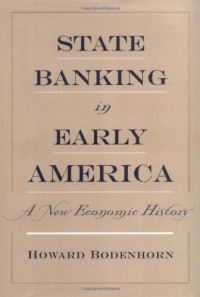 A big part of the motivation for this book seems to have been Bodenhorn’s desire to refute the “historical justification” provided by the two classic histories of banking (Redlich’s The Molding of American Banking and Hammond’s Banks and Politics from the Revolution to the Civil War), for central banking in general and the broadening of the Federal Reserve’s powers after the Great Depression in particular. The other claim Bodenhorn makes is that no one has really done an economic history of American banking, applying and testing state of the art economic theories against historical evidence. Both reasons highlight issues: why do we write history, and how best can we communicate historical insights to the public?
A big part of the motivation for this book seems to have been Bodenhorn’s desire to refute the “historical justification” provided by the two classic histories of banking (Redlich’s The Molding of American Banking and Hammond’s Banks and Politics from the Revolution to the Civil War), for central banking in general and the broadening of the Federal Reserve’s powers after the Great Depression in particular. The other claim Bodenhorn makes is that no one has really done an economic history of American banking, applying and testing state of the art economic theories against historical evidence. Both reasons highlight issues: why do we write history, and how best can we communicate historical insights to the public?
AG Transition in NY State-95 (Henry A. Wallace Series on Agricultural History & Rural Life)
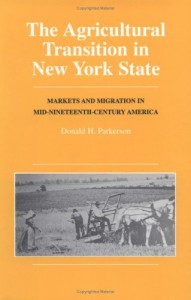 “One of the defining characteristics of mid-nineteenth-century New York State,” Parkerson begins, “was the extraordinary mobility of its rural people.” Contrary to popular belief and a historiographical tradition that mistakenly pictures a stable, tradition-bound rural world in contrast with the (more thoroughly studied) dynamic, industrializing urban world, Parkerson says that “ordinary farm families...embraced social and economic change” largely through chain migrations that extended the households of farmers trying to enter market production.
“One of the defining characteristics of mid-nineteenth-century New York State,” Parkerson begins, “was the extraordinary mobility of its rural people.” Contrary to popular belief and a historiographical tradition that mistakenly pictures a stable, tradition-bound rural world in contrast with the (more thoroughly studied) dynamic, industrializing urban world, Parkerson says that “ordinary farm families...embraced social and economic change” largely through chain migrations that extended the households of farmers trying to enter market production.
A History of Banking in Antebellum America: Financial Markets and Economic Development in an Era of Nation-Building (Studies in Macroeconomic History)
 Bodenhorn says “by 1820...banks became better known, more reputable, more established, and therefore more trusted,” presumably convincing more people (whether as shareholders or depositors) to put their money in banks. This is capital deepening, a supply-side argument: growth happened when banks began to accumulate enough money to lend to industrialists or invest. There’s so little written about banking since Bray Hammond, this is a must-read.
Bodenhorn says “by 1820...banks became better known, more reputable, more established, and therefore more trusted,” presumably convincing more people (whether as shareholders or depositors) to put their money in banks. This is capital deepening, a supply-side argument: growth happened when banks began to accumulate enough money to lend to industrialists or invest. There’s so little written about banking since Bray Hammond, this is a must-read.
Every Farm a Factory: The Industrial Ideal in American Agriculture (Yale Agrarian Studies)
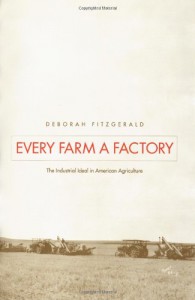 Fitzgerald’s argument is that “although individual technologies, particular pieces of legislation, new sorts of expertise, and the availability or disappearance of credit opportunities are all key to understanding what happened in twentieth-century agriculture, it is essential to grasp the overarching logic of change that was taking place in bits and pieces and the industrial system that was being constructed across the country.” This modernization was oriented toward improving “efficiency” to the ideal point when “rational management techniques” took over farm life: “Every Farm a Factory” comes from and International Harvester ad.
Fitzgerald’s argument is that “although individual technologies, particular pieces of legislation, new sorts of expertise, and the availability or disappearance of credit opportunities are all key to understanding what happened in twentieth-century agriculture, it is essential to grasp the overarching logic of change that was taking place in bits and pieces and the industrial system that was being constructed across the country.” This modernization was oriented toward improving “efficiency” to the ideal point when “rational management techniques” took over farm life: “Every Farm a Factory” comes from and International Harvester ad.
Capitalism and a New Social Order (Anson G. Phelps Lectureship on Early American History)
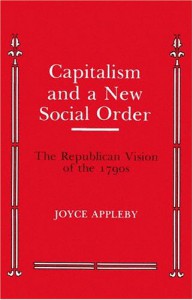 An interesting element of Appleby’s argument is that she’s talking about intellectual history, not economic determinism. While she acknowledges the influence of material changes, she’s really interested in the “Ideas [that] joined a group of established elite reformers to a network of political interlopers,” resulting in the Jeffersonian revolution of 1800. Appleby doesn’t completely sustain this point, I think; especially in the sense that she doesn’t identify the chicken and the egg. But it’s her characterization of the Federalists as upholders of the mainstream tradition that’s most interesting. The Federalists, she says, “never lost their posture of protecting known truths about civil society.
An interesting element of Appleby’s argument is that she’s talking about intellectual history, not economic determinism. While she acknowledges the influence of material changes, she’s really interested in the “Ideas [that] joined a group of established elite reformers to a network of political interlopers,” resulting in the Jeffersonian revolution of 1800. Appleby doesn’t completely sustain this point, I think; especially in the sense that she doesn’t identify the chicken and the egg. But it’s her characterization of the Federalists as upholders of the mainstream tradition that’s most interesting. The Federalists, she says, “never lost their posture of protecting known truths about civil society.
Conceiving the Future: Pronatalism, Reproduction, and the Family in the United States, 1890-1938 (Gender and American Culture)
 Lovett’s 1998 UC Berkeley dissertation underlying this book was subtitled Nostalgic modernism, reproduction, and the family in the United States, 1890-1930. In the new introduction, Lovett says the U.S. “invested heavily in the reproduction of its citizenry during the early twentieth century.” She labels this covert, relatively non-coercive public policy focus “pronatalism” and suggests the subjects of her study “promoted reproduction indirectly.” Setting aside the pronatalist framing argument she introduced in the book, Lovett’s study of five reformers shows how they all used symbols and images of family and rural life, and asks important questions regarding the power these symbols had over the reformers as well as their audiences.
Lovett’s 1998 UC Berkeley dissertation underlying this book was subtitled Nostalgic modernism, reproduction, and the family in the United States, 1890-1930. In the new introduction, Lovett says the U.S. “invested heavily in the reproduction of its citizenry during the early twentieth century.” She labels this covert, relatively non-coercive public policy focus “pronatalism” and suggests the subjects of her study “promoted reproduction indirectly.” Setting aside the pronatalist framing argument she introduced in the book, Lovett’s study of five reformers shows how they all used symbols and images of family and rural life, and asks important questions regarding the power these symbols had over the reformers as well as their audiences.
Nature and Power: A Global History of the Environment (Publications of the German Historical Institute)
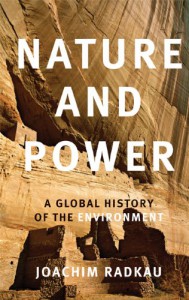 Joachim Radkau says he was painfully aware of the pitfalls faced by authors of big histories when he chose to write a global history of the environment. But he believed several themes including European exceptionalism, the dialog between the ideals of wilderness and sustainability, the effects of state, local, and individual control on environmental engagement, regulation of sexuality and xenophobia deserved greater attention. His decision to translate Nature and Power into English was motivated by these issues, and also by a belief that “Old World” experience was key to 21st century environmentalism.
Joachim Radkau says he was painfully aware of the pitfalls faced by authors of big histories when he chose to write a global history of the environment. But he believed several themes including European exceptionalism, the dialog between the ideals of wilderness and sustainability, the effects of state, local, and individual control on environmental engagement, regulation of sexuality and xenophobia deserved greater attention. His decision to translate Nature and Power into English was motivated by these issues, and also by a belief that “Old World” experience was key to 21st century environmentalism.
The Panic of 1857 and the Coming of the Civil War
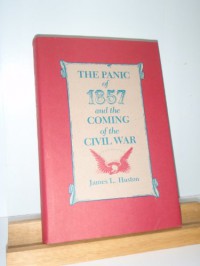 Huston examines the economic events leading up to the Crisis in a very cursory fashion, then spends a fair amount of time discussing political and press reaction to it. This leads him to some conclusions about the role of the Crisis in foregrounding some economic issues in the sectional debate that led to the Civil War, although Huston is quick to qualify these claims and place them in a generalized “blame-everything-on-slavery” context.
Huston examines the economic events leading up to the Crisis in a very cursory fashion, then spends a fair amount of time discussing political and press reaction to it. This leads him to some conclusions about the role of the Crisis in foregrounding some economic issues in the sectional debate that led to the Civil War, although Huston is quick to qualify these claims and place them in a generalized “blame-everything-on-slavery” context.
From Market-Places to a Market Economy: The Transformation of Rural Massachusetts, 1750-1850
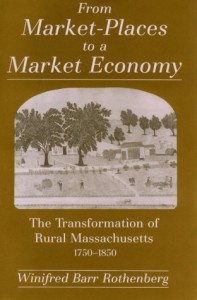 Through extensive primary research and mathematical modeling, Rothenberg came to the conclusion that the “capitalist transition” began around 1750, and was substantially underway in rural Massachusetts by 1800. While she performs a little sleight of hand navigating between a tight, economist’s definition of capital and markets, and the expansive, politically loaded language used in the historians’ debate, Rothenberg uncovers some really valuable data which helps advance our understanding of events, wherever we stand on the “social vs. market” historiographical spectrum.
Through extensive primary research and mathematical modeling, Rothenberg came to the conclusion that the “capitalist transition” began around 1750, and was substantially underway in rural Massachusetts by 1800. While she performs a little sleight of hand navigating between a tight, economist’s definition of capital and markets, and the expansive, politically loaded language used in the historians’ debate, Rothenberg uncovers some really valuable data which helps advance our understanding of events, wherever we stand on the “social vs. market” historiographical spectrum.
Historical Thinking and Other Unnatural Acts: Charting the Future of Teaching the Past (Critical Perspectives On The Past)
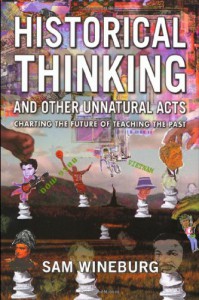 The subtitle of this award-winning volume of essays, promises to chart the future of teaching the past. Wineburg’s main point, that the “historical thinking” and close, critical reading practiced by professional historians are very different from the ways students in other fields (and high school students, even in history classes) are taught to read and think. This is a valuable insight, which historians who write for the public (and grad students) would benefit from pondering. Wineburg’s essays, gathered from a decade of articles, conference papers and informal presentations, open a new field of study and outline a number of questions that he and others have begun trying to answer.
The subtitle of this award-winning volume of essays, promises to chart the future of teaching the past. Wineburg’s main point, that the “historical thinking” and close, critical reading practiced by professional historians are very different from the ways students in other fields (and high school students, even in history classes) are taught to read and think. This is a valuable insight, which historians who write for the public (and grad students) would benefit from pondering. Wineburg’s essays, gathered from a decade of articles, conference papers and informal presentations, open a new field of study and outline a number of questions that he and others have begun trying to answer.
The Uprooted
 Handlin’s “history of immigration is a history of alienation and its consequences.” But he never mentions anyone in particular. “I have not found it in the nature of this work to give its pages the usual historical documentation,” he says. Freed from any obligation to support his generalizations with the experiences (much less the voices) of real people, Handlin paints a picture of superstitious, ignorant peasants who are too thick to understand the new society they find in America. They huddle together in ghettos until they are told by their social betters that they must become American; and then they discover the depth of their alienation -- they will never belong, and they can never go home. Mario Puzo had more insights to share than Handlin, and this won the Pulitzer for history because Handlin was a rock-star historian. A low moment for the profession.
Handlin’s “history of immigration is a history of alienation and its consequences.” But he never mentions anyone in particular. “I have not found it in the nature of this work to give its pages the usual historical documentation,” he says. Freed from any obligation to support his generalizations with the experiences (much less the voices) of real people, Handlin paints a picture of superstitious, ignorant peasants who are too thick to understand the new society they find in America. They huddle together in ghettos until they are told by their social betters that they must become American; and then they discover the depth of their alienation -- they will never belong, and they can never go home. Mario Puzo had more insights to share than Handlin, and this won the Pulitzer for history because Handlin was a rock-star historian. A low moment for the profession.
Mr. Madison's war: Politics, diplomacy, and warfare in the early American republic, 1783-1830
 Stagg admits that the dominant feature of almost all literature” on the War of 1812 “has been its emphasis on the sheer ineptitude of the American war effort.” But even so, “to stress ineptitude as the theme of the War of 1812...is to neglect an important, albeit obvious, point about its history--which is that no administration could have actually intended what happened to have occurred.” The question is, was there a realistic plan behind Madison’s policy, or was he too a source of incompetence?
Stagg admits that the dominant feature of almost all literature” on the War of 1812 “has been its emphasis on the sheer ineptitude of the American war effort.” But even so, “to stress ineptitude as the theme of the War of 1812...is to neglect an important, albeit obvious, point about its history--which is that no administration could have actually intended what happened to have occurred.” The question is, was there a realistic plan behind Madison’s policy, or was he too a source of incompetence?
Metahistory: The Historical Imagination in Nineteenth-Century Europe
 Although virtually unreadable, this book is important. White says history is a verbal artifact that we use to “combine a certain amount of data, theoretical concepts for explaining these data, and a narrative structure for their presentation.” So understanding the tools available to us as storytellers and writers is key. I really like White, for the style of his shorter articles, and for his sarcasm when he’s arguing with literalists like Arthur Marwick.
Although virtually unreadable, this book is important. White says history is a verbal artifact that we use to “combine a certain amount of data, theoretical concepts for explaining these data, and a narrative structure for their presentation.” So understanding the tools available to us as storytellers and writers is key. I really like White, for the style of his shorter articles, and for his sarcasm when he’s arguing with literalists like Arthur Marwick.

